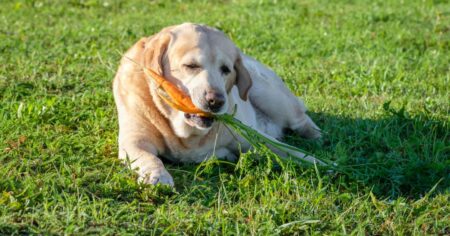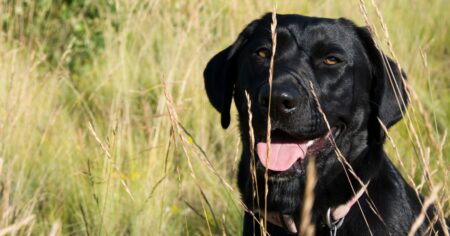You can go organic in three different ways. Choose a commercial dog food that is organic, cook for your Labrador retriever or you can feed raw. Raw food is the best for most Labs, and you have several methods of feeding to choose from.
The easiest is bones and raw food, or BARF for short. Before you choose an organic dog food for your Labrador retriever, you should know if it has any allergies or if there are other medical reasons your best friend shouldn’t eat a certain type of food. Many people switch to raw food because they can control what their dog eats. With commercial foods, you don’t have this benefit.
Commercial Organic Foods
Photo: Credit
Check the labels for ingredients that your pup may be allergic to or that it may have an intolerance for if you choose a commercial organic food. Many dogs have an intolerance or may be allergic to flaxseed, corn and wheat. Even though a food’s label is organic, that doesn’t mean that it doesn’t contain ingredients that may be harmful to your Lab.
Cooked Diets
Photo: Credit
Cooking for your Labrador retriever is also another way to ensure that it gets nothing but healthy food. Though cooking does remove some of the nutrients, it’s still better than feeding many of the commercial foods on the market. Some dogs may not be able to tolerate the raw diet, though that is pretty rare.
When you choose a cooked diet for your Lab, that doesn’t mean that you have to cook for it every day. Instead, make meals for a month at a time and freeze them is Labrador retriever-sized portions. If you make the food for a month at a time, you can easily follow the rule, “Balance over time.”
This means that you don’t have to feed all the nutrients in one meal. Instead, you can feed certain foods for those nutrients some of the time.
For example, if the base protein is chicken, you may add pork one week, beef the second week, venison in the third week and fish in the fourth week. You’ll also want to add eggs to your Lab’s diet. Since you can’t feed cooked bones, you’ll have to add the calcium in another form, whether you choose to supplement with vitamins or add certain foods with calcium such as egg shells.
Creating a Raw Diet
Photo: Credit
Creating a raw diet is much the same as creating a cooked diet. However, you have to know your dog. Certain raw bones are forbidden, especially if your Labrador is a power chewer. Riblets, chicken frames and chicken leg and thigh bones are safe for most dogs. If your dog loves to gulp its food, then you should stay away from neck bones since they are smaller and round. They are more apt to pose a choking hazard.
Most beef bones are too hard for any dog, including Labs. Pork rib bones like those that you find in pork chops are okay for dogs that chew their food, although if they are thick-cut, they could cause broken teeth or a choking hazard. As with cooked diets, add eggs to the raw diet. You can feed your Labrador retriever raw eggs.
While any food that you would eat from the supermarket is fine for your Lab, the best, if you can afford it, is organic. This means that the meat came from grass fed, free range animals that were not fed antibiotics, GMO corn and other food with chemicals.
The Benefits of Feeding an Organic Diet
Photo: Credit
You’ll notice a difference in your Labrador’s looks, energy and health regardless of which organic diet you choose. However, you’ll see the biggest difference if you choose a raw diet.
Health Benefits
If your Labrador retriever has allergies to plants, it may show up as dry skin, hot spots or even itchy feet. This is when you may want to stay away from foods with grains in them. You’ll notice that after a few weeks of feeding raw or cooked foods that do not have grains and grain-based ingredients that the coat is sleeker, the skin is not as dry and the hot spots disappear.
When you feed a species-appropriate organic diet, you are feeding less “junk.” Because your Lab’s body uses more of what it eats, its poops are going to be smaller and will also smell less. You can also determine what is needed in the diet by going on “poop patrol.” If the poop is not perfectly formed and too soft, your Labrador retriever needs more bone. If your pup is constipated, you are feeding too much bone. You’ll be able to adjust your Lab’s meals until you get the perfect mixture for your dog.
More Energy
Carbohydrates convert to sugar, which may make your Labrador retriever sluggish. Just compare it to your kid after the sugar high wears off. A dog’s digestive system is designed to thrive on protein so you’ll notice that your Lab has more energy with a species-appropriate organic diet.
Pretty Doggy
Even if your Lab doesn’t have health problems, you’ll still notice the difference when you switch over to an organic diet. Its coat will be shinier and thicker. Its gums and eyes will look healthier. You may even notice less shedding. You’ll also notice that you won’t have to bathe your Lab quite as often. Unless, your Lab is like any other Lab and jumps in even the smallest puddle of water.
Forbidden Foods and Other Basics
Photo: Credit
Just because you decide to feed your Lab an organic diet doesn’t mean that you don’t have to watch what you feed it. Some foods, such as grapes, raisins, chocolate, avocado and onion could make your Lab sick or even cause death.
Once you determine which type of organic diet you want to feed, you’ll need to do more research on the actual diet. For example, weight bearing bones are not fit to feed as they could crack teeth. Dogs do not get any benefit out of vegetables unless they are pulverized. If you feed them whole, they are likely to come out the other end whole.












